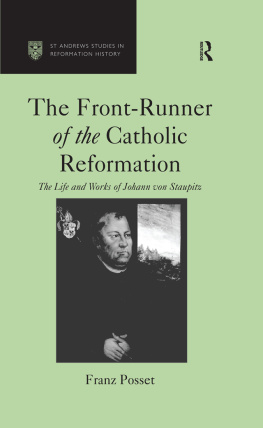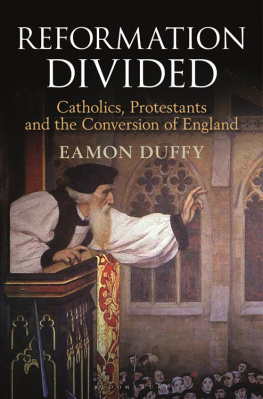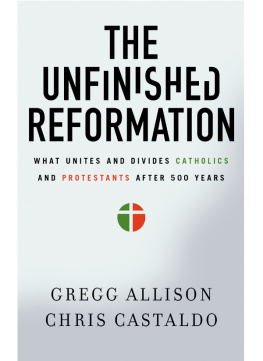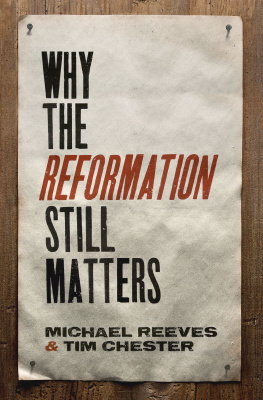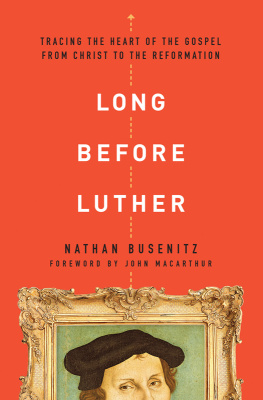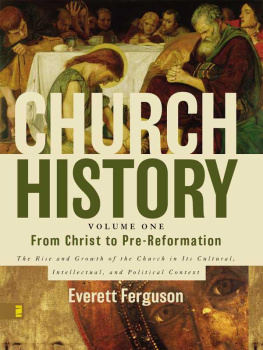PENGUIN BOOKS
THE PENGUIN HISTORY OF THE CHURCH
Volume Three
Towards the end of the Middle Ages, as the Popes became less able to hold western Christendom together cries for reform sounded throughout northern Europe. To reform the exactions of churchmen, to reform errors of doctrine, and to reform the morals of society these three became the confused aims of what are loosely called the Reformation and the Counter-Reformation.
Western Europe split into a Catholic south, bound by a tradition which codified at the Council of Trent, and a Protestant north which sought to test all religious authority by the open Bible. Across the no mans land between them were fought the bitterest wars of religion in Christian history, until gradually the modern religious map of Europe took shape.
In this volume of The Penguin History of the Church Professor Owen Chadwick deals with the formative work of Erasmus, Luther, Zwingli, Calvin, with the special circumstances of the English Reformation, and with the Jesuits and the Counter-Reformation.
Owen Chadwick was born in 1916 and from 1947 taught history at Cambridge University, where from 1968 to 1983 he was the Regius Professor of Modern History. He has worked on the history of Christian ideas and life. His books include John Cassian, The Victorian Church, From Bossuet to Newman, The Secularization of the European Mind, Newman, The Popes and European Revolution, The Making of the Benedictine Ideal, Hensley Henson, The Spirit of the Oxford Movement, Britain and the Vatican during the Second World War and Michael Ramsey: A Life. Owen Chadwick is also the author of The Christian Church in the Cold War, the seventh volume in The Penguin History of the Church series, and has revised the second edition of volume six, A History of Christian Missions, by Stephen Neill (1990).
OWEN CHADWICK
The Reformation

PENGUIN BOOKS
PENGUIN BOOKS
Published by the Penguin Group
Penguin Books Ltd, 80 Strand, London WC2R 0RL, England
Penguin Putnam Inc., 375 Hudson Street, New York, New York 10014, USA
Penguin Books Australia Ltd, 250 Camberwell Road, Camberwell, Victoria 3124, Australia
Penguin Books Canada Ltd, 10 Alcorn Avenue, Toronto, Ontario, Canada M4V 3B2
Penguin Books India (P) Ltd, 11 Community Centre, Panchsheel Park, New Delhi 110 017, India
Penguin Books (NZ) Ltd, Cnr Rosedale and Airborne Roads, Albany, Auckland, New Zealand
Penguin Books (South Africa) (Pty) Ltd, 24 Sturdee Avenue, Rosebank 2196, South Africa
Penguin Books Ltd, Registered Offices: 80 Strand, London WC2R 0RL, England
www.penguin.com
First published in Pelican Books 1964
Reprinted with revisions 1969
Reprinted with revisions 1972
Reprinted in Penguin Books 1990
Copyright Owen Chadwick, 1964, 1969, 1972
All rights reserved
Except in the United States of America, this book is sold subject to the condition that it shall not, by way of trade or otherwise, be lent, re-sold, hired out, or otherwise circulated without the publishers prior consent in any form of binding or cover other than that in which it is published and without a similar condition including this condition being imposed on the subsequent purchaser
ISBN: 978-0-14-196705-9
The Penguin History of the Church
(formerly The Pelican History of the Church)
GENERAL EDITOR: OWEN CHADWICK
- The Early Church. By Sir Henry Chadwick, Honorary Fellow and former Master of Peterhouse, Cambridge and Regius Professor Emeritus of Divinity, Cambridge University.
- Western Society and the Church in the Middle Ages. By Sir Richard Southern, formerly President of St Johns College, Oxford.
- The Reformation. By Owen Chadwick, Chancellor of the University of East Anglia and former Regius Professor of Modern History, Cambridge University.
- The Church and the Age of Reason, 16481789. By Gerald R. Cragg, formerly Professor of Church History at Andover Newton Theological School, Boston, Mass.
- The Church in an Age of Revolution. By Alec R. Vidler, formerly Fellow and Dean of Kings College, Cambridge.
- A History of Christian Missions. By Stephen Neill, formerly Professor of Philosophy and Religious Studies at the University of Nairobi and Assistant Bishop in the Diocese of Oxford.
- The Christian Church in the Cold War. By Owen Chadwick, Chancellor of the University of East Anglia and former Regius Professor of Modern History, Cambridge University.
Thanks for various kindness to R. W. Southern, Gordon Rupp, H. O. Evennett, H. C. Porter, Basil Hall, John Macauley, A. S. Bell, Martin Chadwick, Hugh Mead, and Edith Baker.
Part One
THE PROTEST
1
The Cry for Reformation
THE IDEA OF REFORMATION
A T the beginning of the sixteenth century everyone that mattered in the Western Church was crying out for reformation.
For a century and more Western Europe had sought for reform of the Church in head and members and had failed to find it.
If you asked people what they meant when they said that the Church was in need of reform, they would not have found it easy to agree. Many rectors did not live or work in their parishes. Yet there might be excellent reasons for allowing them to work elsewhere and still to draw the stipend of the parish. The Popes laws, interfered in many matters of Church and State, and men talked of a need to limit the Popes authority; but some of them needed the help of the Pope to manage the Church in their lands, and used the Popes supreme power as a dispensing agent, a loophole by which princes or bishops might escape the rigorous working of church laws.
Everyone protested that to buy or sell work in the Church whether bishoprics, or the parish ministry was deplorable. It was the sin known as simony. But to pay fees on entry to an office could be defended as a form of taxation, or as a payment for the lawyers expenses. It was at first sight disgraceful that the Bishop of Worcester should be an Italian continuously resident at and engaged upon administrative duties in the court of Rome. But the King of England needed an ecclesiastical agent at the Vatican and thought it not unreasonable that an English ecclesiastical office should pay his stipend. What one honest man believed to be an abuse, another honest man defended.
Everyone wanted reform, or professed to want reform. How to reform and what to reform was not so clear. The energies of some reformers went to create new religious orders, or little groups of prayer and study. Bishops tried to be stricter against ordaining ignorant men, or to compel monks and canons to live according to their rule. But at the administrative level the quest for reform limped along like a lame man who does not know where he is going. From 1512 to 1517 a great Council of the Church, called Ecumenical (though few besides Italians were present), was sitting in the Lateran church at Rome. Its members listened to long and eloquent speeches, and sat for many hours. They agreed, amid much else, that schism and heresy should be suppressed; that the Turks were a danger to the Christian nations; that bishops should have more power over the monks, and that no one might preach except by lawful authority; that the Roman mobs must not sack the cardinals houses on the Popes death; that professors in their lectures must establish the truth of the souls immortality; that the printing of unsound books should be stopped. The men of a reforming spirit might think these conclusions edifying. But some at least did not recognize in the decrees of the Council a fulfilment of the vague and elusive phrase, reform in head and members.
Next page


